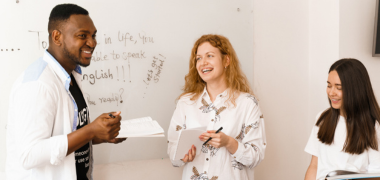
Popular courses in Darwin
Certificate IV in English Language Teaching (TESOL)
- There are no mandated entry requirements.
 Melbourne City Institute of Education
Melbourne City Institute of Education
Bachelor of Computer Science
- There are no mandated entry requirements.
 Charles Darwin University
Charles Darwin University
Bachelor of Education (Primary)
- There are no mandated entry requirements.



Bachelor of Education (Secondary)
- There are no mandated entry requirements.
 Alphacrucis University College
Alphacrucis University College
Diploma of English Language Teaching (TESOL)
- There are no mandated entry requirements.


Bachelor of Arts (Ancient Greek)
- There are no mandated entry requirements.
 Australian National University
Australian National University
Bachelor of Arts (Ancient History)
- There are no mandated entry requirements.
 Australian National University
Australian National University
Bachelor of Arts (Arabic)
- There are no mandated entry requirements.
 Australian National University
Australian National University
Bachelor of Arts (Chinese Studies)
- There are no mandated entry requirements.
 Australian National University
Australian National University
Bachelor of Arts (English)
- There are no mandated entry requirements.
 Australian National University
Australian National University
Bachelor of Arts (Indonesian Studies)
- There are no mandated entry requirements.
 Australian National University
Australian National University
Bachelor of Arts (Japanese Studies)
- There are no mandated entry requirements.
 Australian National University
Australian National University
Bachelor of Arts (Korean Studies)
- There are no mandated entry requirements.
 Australian National University
Australian National University
Bachelor of Arts (Latin)
- There are no mandated entry requirements.
 Australian National University
Australian National University
Bachelor of Arts (Linguistics)
- There are no mandated entry requirements.
 Australian National University
Australian National University
Bachelor of Arts (Philosophy)
- There are no mandated entry requirements.
 Australian National University
Australian National University
Bachelor of Arts (Spanish)
- There are no mandated entry requirements.
 Australian National University
Australian National University
Master of Teaching (Secondary)
- There are no mandated entry requirements.






Master of Education (Teaching English to Speakers of Other Languages - TESOL)
- There are no mandated entry requirements.



Bachelor of Arts (Honours) (English)
- There are no mandated entry requirements.
 Australian National University
Australian National University
Frequently Asked Questions
Yes, there are course providers who offer 20 qualification(s) in Darwin. Find a course provider near you. Once you make an enquiry, a course advisor will get in touch to discuss your study options and course fees.
Written by Courses.com.au Team
There are several campuses within the Darwin area that provide language training. The closest campus is 8km away from the center of Darwin. You can also study a language course through online, traineeship learning. Find a course provider that best suits your needs.
Written by Courses.com.au Team
Potential job roles within language includes english tutor, esl teacher or interpreter translator (to name a few). Browse related occupations to find a career that suits your needs.
Written by Courses.com.au Team
Further reading


A Complete Guide to Certificates II & III in Security Operations
24th February 2025)
